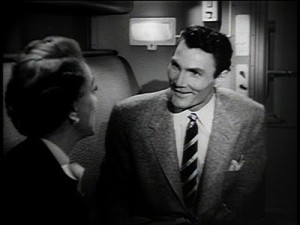Sudden Fear/1952/RKO Radio Pictures/110 min.
If you’ve never seen 1952’s “Sudden Fear” by director David Miller, you are in for a treat. I’m not sure why but this film isn’t mentioned very often as an example of noir at its best. It is precisely that – with delightful darkness at its core. And it was nominated for four Academy Awards: actress, supporting actor, b&w cinematography and b&w costume design.
Hmm, where to begin my gushfest? Well, first of all, it stars Joan Crawford as heiress and playwright Myra Hudson. Glamorous, successful and gracious, Myra has everything in the world, except a man.
But that all changes fast. While sitting in on a rehearsal for her new play’s Broadway opening, Myra fires actor Lester Blaine (Jack Palance; the part was also offered to Marlon Brando). After the show is a smash hit, she runs into him by chance on the train back to her home in San Francisco. By the end of the trip, Myra and Lester seem to be in love. Lester is an actor, after all.
The truth is he has some unfinished business, or more accurately unrealized schemes, with ex-flame Irene Neves (Gloria Grahame). They have expensive taste but no cash; that’s where Myra’s money and a tragic “accident” come in.
Myra isn’t fooled for long, though certainly she has her share of night sweats and shakes. Her playwright’s skill for crafting plot lines as well as a knack for stunts and a talent for forgery come in mighty handy as she painstakingly plans a way to exact her revenge.
Crawford is captivating as the writer/wife with a wickedly resourceful streak. The scene in which she learns of Lester’s betrayal is remarkable – it hinges completely on her wordless, visceral reaction. Grahame sizzles as a smooth operator working every angle she can. Crawford also served as the film’s executive producer; she and Grahame reportedly did not get along. Shocker! Tall, craggy-faced Palance, in his first major screen role, effortlessly exudes mystery and menace. It’s chilling to see Lester morph from solicitous to sinister at the drop of a hat.
Miller, an underrated director, borrows a bit from the horror genre (rest assured, there’s a screeching cat, among other creepy tropes) and outdoes himself with this subversive, scary melodrama that just oozes tension. Love the chase scene toward the end. Miller worked from a strong, clever script by Lenore Coffee and Robert Smith from a novel by Edna Sherry.
The visuals are magnificent, noir at its finest, courtesy of cinematographer Charles B. Lang Jr. Black stripes and bars invade every scene, suggesting the characters’ entrapment in their fate. Intense contrast and chiaroscuro lend a painterly quality. Elmer Bernstein’s score, part nerve-wracking and part lushly romantic, is also key to building the suspense. [Read more…]












From FNB readers